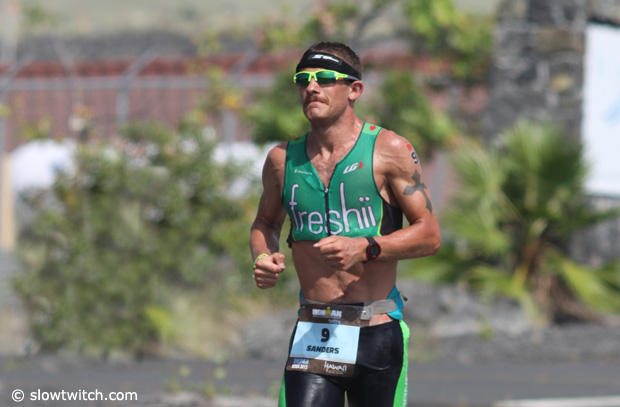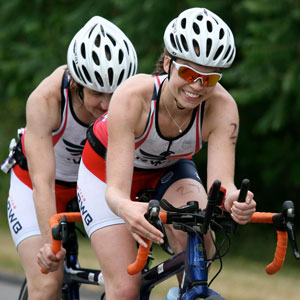Keyword: Ambition
Lionel Sanders made a new fan last Saturday. Me. Actually, it wasn't on that day I became a fan, but in the days that followed.
He began his day dubiously, as this demon-once-on-land followed Matt Chrabot in the swim. Followed? Like eventual winner Jan Frodeno followed Andy Potts, who followed Dylan McNeice? Kind of.
In triathlon's formative years it was determined that close proximity was okay in the swim and run, just not on the bike (and it remains that way today, except for where it's legal to draft, such as in draft-legal road triathlon and in off-road triathlon).
There was an important distinction between Lionel's case and the swimmers further ahead. Lionel was never going to be dropped by Matt Chrabot in the swim because Matt's job during the swim, according to Lionel and to every spectator with a pair of eyes, was to make sure Lionel got out of the water as fast as possible. Is there a difference between what Matt and Lionel were doing versus what Dylan and Andy were doing at the head of the swim field? Yes.

Here are the relevant words in USAT's rule regarding unauthorized assistance:
Article 3.4(d): Unauthorized Assistance: No participant shall accept from any person … physical assistance in any form … including … pacing.
USA Triathlon goes on to explain this rule on its Rules Education page, for those still in a fog:
"This rule captures part of the essence of what triathlon under USA Triathlon rules is all about and that is, triathlon is an individual sport. Participants must rely only upon themselves to complete the race… ‘Pacing,' defined as making forward progress while being accompanied by someone who is not currently competing in the race, is never allowed."
If your goal is to make a case allowing what Lionel and Matt did, you might argue that Matt Chrabot was "currently competing in the race." Ironman has had trouble with pacing in the past, most notably when a pro or top age-group man positions himself to pace a pro women during the bike leg. The man in this case is "currently competing in the race" to those who consider this legal (sidestepping the question of whether it is ethical).
So Ironman went further in its own rules specifically for pro athletes in its races:
Article 2.0.2(a): Outside Assistance: An athlete may not subordinate his/her race ambitions solely for the benefit of another athlete's race ambitions. The penalty for this will be disqualification of both athletes; (DSQ of both athletes).
Ironman tired of hosting events that were individual for everybody other than the one with his or her own majordomo. It felt so strongly about this that it "upgraded" the penalty for unauthorized or outside assistance from USAT's variable time penalty to a DQ.
"Ambition" is key here and is why this word was chosen in Ironman's pro rules. If we can take as axiomatic that the point of a competition is to perform to the level of one's ability, when a competitor abandons his attempt to finish as high as he can, instead adopting the role of supporting another athlete's ambition, that athlete is no longer "currently competing in the race," for the purpose of this rule. Now, the athlete having abandoned his own race ambition is "pacing" another, and pacing is against the rules.
What about bike racing? What about draft-legal triathlon? Different events. Different race culture. Different rules. What about the "legal" pelotons in no-draft triathlon? Draft zones on the bike are examples of the tension between the need to preserve this ethic and practicality. Had we, way back when, the practical latitude to create a draft box 50 yards long and 10 yards wide around every rider, we would have.
Why did I become a fan of Lionel Sanders after this is clearly what was done this past Saturday at the Hawaiian Ironman? Here is what Lionel wrote on our Reader Forum:
My first thought was that this would be against the rules, in the same manner that having your coach bike beside you is against the rules… Admittedly, the idea did not sit very well with me, but if it wasn't against the rules I guess it was worth a shot… It was a cop-out and I regret even testing the idea. Instead of looking for shortcuts, learn how to swim."
Lionel is relatively new to triathlon, and was talked into this by some who do not share my opinion of this kind of race strategy (neither the ethics nor the legality). Lionel, it turns out, shares my view, it just took Lionel this experience to have his own opinion age in the barrel. From what I hear secondhand (I haven't spoken to him), Lionel feels very badly now about how the swim was conducted. From now on I suspect Lionel will trust his own judgment on issues like this. Lionel became a more fully-vested member of the triathlon community on Saturday, and not because he raced the Hawaiian Ironman.
There is one exception to the above. If you really want to abandon your own race ambitions in order to aid another, become a guide for a blind triathlete. Here is the one space in the rules open to you.


